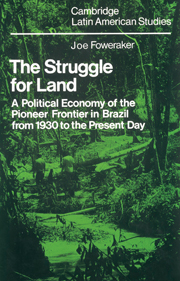 The Struggle for Land
The Struggle for Land Book contents
- Frontmatter
- Contents
- List of maps
- Preface
- Glossary of acronyms and abbreviations used in the text
- Glossary of words and phrases in Portuguese used in the text
- 1 Brazil: political and administrative divisions
- 2 Principal frontier regions
- 3 West Paraná: estates and municipalities
- 4 South Pará
- 5 South Mato Grosso
- Part 1 The pioneer frontier
- Part 2 Political mediation
- Part 3 Accumulation and authoritarianism
- 8 Primitive accumulation and violence on the frontier
- 9 The frontier and the reproduction of authoritarian capitalism
- 10 The frontier and the formation of the Brazilian State
- Bibliography
- Index
- CAMBRIDGE LATIN AMERICAN STUDIES
10 - The frontier and the formation of the Brazilian State
Published online by Cambridge University Press: 29 October 2009
- Frontmatter
- Contents
- List of maps
- Preface
- Glossary of acronyms and abbreviations used in the text
- Glossary of words and phrases in Portuguese used in the text
- 1 Brazil: political and administrative divisions
- 2 Principal frontier regions
- 3 West Paraná: estates and municipalities
- 4 South Pará
- 5 South Mato Grosso
- Part 1 The pioneer frontier
- Part 2 Political mediation
- Part 3 Accumulation and authoritarianism
- 8 Primitive accumulation and violence on the frontier
- 9 The frontier and the reproduction of authoritarian capitalism
- 10 The frontier and the formation of the Brazilian State
- Bibliography
- Index
- CAMBRIDGE LATIN AMERICAN STUDIES
Summary
Historically a continuing political intervention has been required to reproduce the conditions for accumulation in the Brazilian countryside. In particular it is the different institutions of labour control in the countryside which have effectively contained these conditions through the monopoly of land and the subordination of the slaves or peasants. This pattern of extensive monopoly of land was established during the colonial period. In contrast to Spanish America, the late discovery of precious metals led to a conquest by ‘colonisation’, and sugar production in engenho, not silver mines, shaped the settlement of Brazil (Halperín 1969). At the same time the Portuguese colonial administration commanded relatively fewer resources than the Spanish, and the consequent devolution of power to local landowners led to a socio-juridical division of the land which was far in advance of economic demands (Prado 1962a). However, these demands increased dramatically after the transition from production for a colonially controlled market to production for a world market which by early in the nineteenth century represented a generalisation of appropriation of surplus through exchange relations dominated by commercial capital. At the political level this transition was from control by colonial administration to control by an autonomous Brazilian State: given the political conditions for accumulation, this control was inevitably vested in the State apparatuses in the countryside, which made this incipient State a landowners' State.
During the Empire the landowners were both the dominant class and the class-in-charge of the State (Poulantzas 1968).
- Type
- Chapter
- Information
- The Struggle for LandA Political Economy of the Pioneer Frontier in Brazil from 1930 to the Present Day, pp. 209 - 234Publisher: Cambridge University PressPrint publication year: 1981
